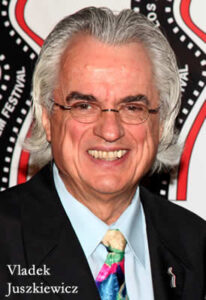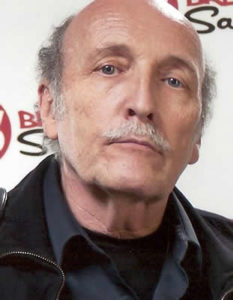As far as I Can Walk, from Serbia, Luxembourg, directed by Stefan Arsenijević, won MOZAIK Bridging The Borders Award at the award ceremony of 17th Edition of the SEEfest, South East European Film Festival LA
Also SUGHRA’S SONS from Azerbaijan and France, directed by Ilgar Najaf received CWB’s jury Honorary Mention
MOZAIK Bridging The Borders Award is offered by Cinema Without Borders Foundation and sponsored by MOZAIK Philanthropy.
The award ceremony was held in LA’s Fine Arts Theater and Bijan Tehrani, Vladek Juszkiewicz and Susan Morgan Cooper, MOZAIK Bridging The Borders Award jury members announced the winning film: “We had seven amazing feature film nominated for MOZAIK Bridging The Borders Award and it was very hard to pick one film as a winner and another for our Honorary mention, Our Honorary mention is a powerful anti-social realist, anti-Communist film attacking the overreach of the Soviet centralized government. This artistically shot film is Ilgar Najaf’s SUGHRA’S SONS.
In a run- down migrant camp in Serbia, a young man from Mali and his wife awaits their papers. It’s announced that the man is accepted into a Serbian football team which will expedite their papers. But on that same day … his wife goes missing and he is forced to walk on a very long journey in search of her. The Winner of MOZAIK Bridging the Borders’s Award is As far as I Can Walk, directed by Stefan Arsenijević which paints an authentic and searing portrait of the invisible, impossible lives of migrants.”
Other SEEfest 2022 Awards:
SEEfest 2022 Jury Awards:
Best Feature Film, Grand Jury Prize: MURINA by Antoneta Alamat Kusijanović.
Jury members Antoneta Kastrati, Sunnie Rucker-Chang, and Florian Froschmayer awarded the top prize to Croatian ‘sunny noir’ coming-of-age story set on the Adriatic coast, with Honorable Mention for Stefan Arsenijević’s refugee drama AS FAR AS I CAN WALK.
Best Cinematography in Feature Film was awarded to MURINA’s cinematographer Hélène Louvart, while Honorable Mention was given to cinematographer Oleksandr Pozdnyakov for Ukraine’s entry BLINDFOLD. Members of the Jury were Sevdije Kastrati, Germano Saracco and Boris Schaarschmidt.
The Jury for Best Documentary Film, Lelei Lelaulu, Isotta Poggi and Dante Alencastre awarded Swiss-Serbian film DIDA, by Nikola Ilić and Corina Schwingruber-Ilić, with two Honorable Mentions for RECONCILIATION by Marija Zidar and THE IMAGE MACHINE of ALFREDO C. by Roland Sejko. The Jury for Best Cinematography in Documentary Film, Natasha Prosenc-Stearns, Luigia Martelloni and Tchavdar Georgiev awarded cinematographer Dominique Colin for his work on THE DELTA OF BUCHAREST, with Honorable Mention for cinematographer Latif Hasolli, who lensed RECONCILIATION.
In the Best Short Fiction category, Jury members Hettie Lynne Hurtes, Ana Pasti (last year’s winner) and Liana Rae Perez gave the award to Croatian director Rok Biček for PENALTY SHOT. They also cited two Honorable Mentions for MARKO by Marko Šantić (Croatia), and THE CRIMINALS by Serhat Karaaslan (Turkey).
Best Short Documentary Jury members Nicole Block, Valentina Ganeva and Rebecca Berrih awarded YOU CAN’T AUTOMATE ME by Katarina Jazbec, Slovenia, while Honorable Mention was given to ANJELA by Vilma Kartalska (Bulgaria).
Best Animation Short Jury members Goran Ognjanovic, Jeremy Rourke, and Andreas Wessel-Therhorn decided to give the award to CAN YOU SEE THEM? By Bruno Razum, and Honorable Mention to IRIS by Lucija Bužančić, both from Croatia.
Audience Award in the Feature Film category went to AS FAR AS I CAN WALK, (Serbia/Luxembourg) by Stefan Arsenijević; and in Documentary Film, LOOKING FOR HORSES (The Netherlands/Bosnia Herzegovina) by Stefan Pavlović.
Jury members for MOZAIK Bridging the Borders Award were:
 Susan Morgan Cooper
Susan Morgan Cooper
Susan Morgan Cooper is a Director/Producer/ Writer and her credits include:
To the Moon and Back, Documentary, Director/Producer/Writer 2016 (A cinematic act of love and courage’ … Broadway World) – Hopper [In his own words] Documentary, Producer/Writer 2013 (“I was moved to tears” Mike Medavoy) – Mulberry Child, Documentary, Director/Producer/Writer 2012 (‘A powerful and touching film’… 31/2 stars. Roger Ebert) – An Unlikely Weapon [The Eddie Adams Story]..Documentary, Director/Producer/Writer 2008 ( ‘A terrific documentary’ The Hollywood Reporter) – Making Of Shadows in The Sun, Documentary, Director/Producer/Writer 2005 – Heroes And Sheroes. Television Series, Director/Producer/Writer 2000
Mirjana: One Girl’s Journey, Documentary, Director/Producer/Writer 1997 – Stringers, Narrative Short Director/Producer/Writer 1990 – Hadley’s Rebellion, Narrative Feature Associate Producer 1989
 Vladek Juszkiewicz
Vladek Juszkiewicz
Born in Glasgow, Poland. He graduated from the Szczecin Technical University with a degree in Engineering. While attending the University he became a member of The Szczecin Technical University Choir, serving as a President and manager of the group. His travels with the choir to 18 counties including United States where he visited the White House.
When he moved to Warsaw, he became the manager of the Polish international star singer Maryla Rodowicz.
After immigrating to the United States, he worked on 11 films with the late Paul Leder.
In 1999 he founded the Polish Film Festival Los Angeles and served as a director till 2019. Now is serving as the Festival’s Programmer.
Served on the juries of the Los Angeles Hungarian Film Festival, the Los Angeles South East European Film Festival, New York Polish Film Festival and Palm Springs International Film Festival.
Awarded by Polish Government with the Cavalier & Officer Cross of the Order of Merit of the Republic of Poland and Gloria Artis for promoting Polish culture abroad.
 Chale Nafus was born in Dallas during World War II, he attended public schools, spent summers on his sister’s ranch in Comanche County in the 1950s, learned Spanish from schoolmates, and dreamed of getting out of Dallas. After getting through freshman year at SMU, he worked at Texas Instruments before realizing he really needed a college education. After attending the University of Texas at Arlington (B.A., English), La Universidad Autónoma de México, and UT Austin (M.A., English/RTF), he began a long college teaching career at Texas Southmost College (Brownsville), La Universidad de Puerto Rico at Mayaguez, Borough of Manhattan Community College, Kingsborough Community College (Brooklyn), and finally Austin Community College (1973-1998). At the latter, he founded the Department of Radio-TV-Film, taught classes in film studies, and for seven years served as Chair of Humanities (Northridge Campus). Retiring in 1998, Chale spent 4 years traveling and writing before joining the staff of Austin Film Society as Director of Programming (2002-2015). He is now totally retired and happily serving on the boards of Austin Film Society and OUTsider Fest as well as the advisory committees of IndieMeme (South Asian film organization) and Cine Las Americas.
Chale Nafus was born in Dallas during World War II, he attended public schools, spent summers on his sister’s ranch in Comanche County in the 1950s, learned Spanish from schoolmates, and dreamed of getting out of Dallas. After getting through freshman year at SMU, he worked at Texas Instruments before realizing he really needed a college education. After attending the University of Texas at Arlington (B.A., English), La Universidad Autónoma de México, and UT Austin (M.A., English/RTF), he began a long college teaching career at Texas Southmost College (Brownsville), La Universidad de Puerto Rico at Mayaguez, Borough of Manhattan Community College, Kingsborough Community College (Brooklyn), and finally Austin Community College (1973-1998). At the latter, he founded the Department of Radio-TV-Film, taught classes in film studies, and for seven years served as Chair of Humanities (Northridge Campus). Retiring in 1998, Chale spent 4 years traveling and writing before joining the staff of Austin Film Society as Director of Programming (2002-2015). He is now totally retired and happily serving on the boards of Austin Film Society and OUTsider Fest as well as the advisory committees of IndieMeme (South Asian film organization) and Cine Las Americas.
 Bijan Tehrani
Bijan Tehrani
Bijan Tehrani a film director, film critic and writer, works as Editor in Chief of Cinema Without Borders and President of Cinema Without Borders Foundation. Bijan has won several awards in international film festivals and book fairs for his short films and children’s books. He has been writing film critics for several publications during the last four decades.
For the tenth anniversary of Cinema Without Borders, Bijan has received Ambassador of International Cinema Award from South east European Film Festival, Friend of the Festival Award from Polish Film Festival, LA and Gateway to International Cinema.
Winner of MOZAIK Bridging The Borders Award:
AS FAR AS I CAN WALK (Serbia, Luxembourg)
DIRECTOR: Stefan Arsenijević
A re-imagining of a traditional medieval love epic in which contemporary African migrants take the place of Serbian iconic literary heroes. Urgent and timeless at the same time, the adaptation raises questions about identity, tradition, race and love. The film was awarded the Crystal Globe, top prize of the Karlovy Vary Festival in 2021.
CWB’s Honorary Mention:
SUGHRA’S SONS (Azerbaijan, France)
Director: Ilgar Najaf
The women do the work in a remote village while the men are fighting in WWII. A small group of deserters is hiding in the mountains and when Musa joins them, his little brother Bahtiyar acts as the liaison between the men and the village. When Barat, the lewd head of the kolkhoz, is killed by the deserter Ahad, the KGB arrive to look for the deserters and life for Sughra and Bahtiyar takes yet another dramatic turn.

